My name is Raymundo de Jesus Villagra Garcia and I’m 63 years old. I was born in the same house where I currently live in the community of San Isidro, in the mountainous northern region of Nicaragua. My mom’s sister-in-law was the midwife who attended to my birth because it was a three day trip to the nearest hospital in Jinotega. I have eight siblings, plus I had three other siblings who died at a young age since at this time there were no vaccines. My parents were one of the first families to come to this community and there were very few inhabitants. They dedicated themselves to agriculture, mainly planting corn and beans and raising cattle and hogs. It wasn’t until later that we began planting coffee.
When I was 7 years old, classes started being offered in the community and a professor arrived to teach 1st-4th grade. It took me two years to pass first grade and I dropped out after 3rd grade to work full-time on the farm. Every day was the same. I can’t say it was good or bad, just the same. There were no celebrations or toys, just work. I’m grateful for the skills I learned from my parents and from others in the community, for example, I learned about native plants and natural medicine, how to make soap for washing clothes and bathing, how to make shingles and build a house out of wood with a handsaw, and how to make baskets out of bamboo for picking coffee, which I still do today.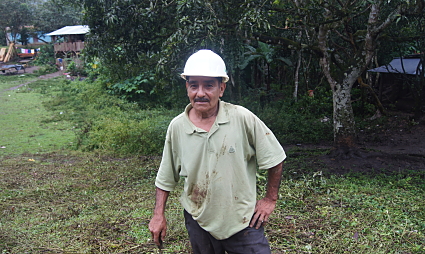
I’ve always had a desire to learn and try new things. When I was 13, my dad helped teach me to play guitar. He taught me the basics and from there I learned by ear since we didn’t have books to read music. If we heard something on the radio, we played around until we learned the notes that sounded like what we had heard. At one point the community needed music for celebrations, so I made some drums out of deer skin and we made a band. We would put on dramas and cultural acts at the school and the church.
When I was 15 a health brigade gave me a kit to test for malaria, and from that point on I began serving the community. The problem was, after giving the tests, people wouldn’t find out if it was positive for at least 6 months since the tests had to be taken to Esteli, and at this time there weren’t roads or vehicles. So in the meantime, people used natural medicine like drinking herbal tea to ease side effects.
When I was 17, I began playing baseball with a ball we had made out of old socks. We formed a team and often traveled to play teams in other communities. This was how I made friends and gained respect not only in my community but in surrounding communities. We always practiced in front of the chapel and one day they asked me to help with the finances since I could read and write. So, I became treasurer at the catholic church and have been involved in leadership ever since.
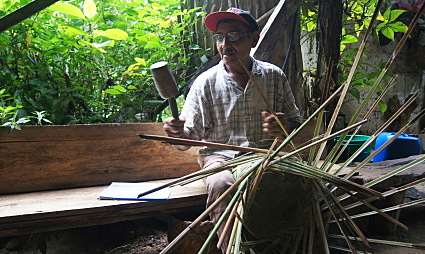 When I was 20, I got married after meeting my wife during coffee picking season. We had 9 children, but one died at the age of 4. It was still difficult for my children to get a formal education and most of them only studied to 3rd or 4th grade. But, I’m proud to say that a few of them were able to go back to school in their adulthood and get their high school degree. I now have 16 grandchildren and one great grandchild, who I hope will be able to receive better education.
When I was 20, I got married after meeting my wife during coffee picking season. We had 9 children, but one died at the age of 4. It was still difficult for my children to get a formal education and most of them only studied to 3rd or 4th grade. But, I’m proud to say that a few of them were able to go back to school in their adulthood and get their high school degree. I now have 16 grandchildren and one great grandchild, who I hope will be able to receive better education.
In the 80’s, during the Sandinista Revolution, I hosted youth at my house who came to the community during the literacy crusade. They taught people the basics, how to write their name and read. After they left I continued giving classes in my house including the history of Nicaragua and basic math. That’s when I decided to request a professor for the community and donate a piece of land to construct the first school, which is used today as the pre-school and health clinic.
During the revolution, I also became involved in health brigades and I was trained in basic first aid. Even though I only knew the basics, people began coming to me when they were injured or sick because they trusted me. I had no idea how to do an injection, but knowing that people trusted me I was able to get the confidence to try. After practicing I was able to do it successfully and now have taught some of my children and others in the community how to do an injection. I also did follow-up with pregnant and nursing women to make sure they were healthy, and I have been a midwife to various births, including to my own wife.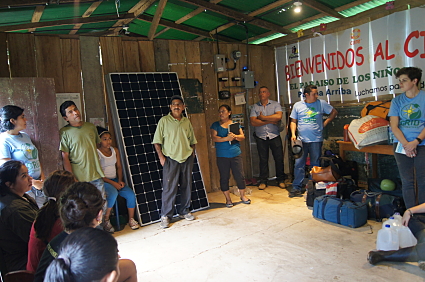
One of the hardest parts of my life was the Contra war in the 80s, mainly because all development in the community came to a standstill. At that time, my family had a large and successful coffee business, but it all fell apart during the war. At that time, there was no free trade so we were forced to sell our crop to the government. The government would give you a check, but it was almost impossible to cash that check. One time I waited in line for a whole week at the bank to cash my check. The currency collapsed and what used to cost C$100 suddenly cost C$100,000, a thousand times as much. We all fell into extreme poverty.
At this time, there was a severe lack of education and healthcare for the children in the community. If one of the children became sick, we had to carry them 4 hours to El Cua by foot and often in the rain. There were no ways to earn an income and no food, only some bitter beans that were given to us by the government since we couldn’t plant for fear of being killed in the fields. Instead of fighting, I decided to stay at home to take care of my family and try to help my community. With difficulty, I was able to get permission and a loan to open a shop at my house during the Contra war. At this time food was rationed and everyone had to walk about an hour into the town of Abisinia and wait in line to receive their ration. Once I opened my shop, the government would bring the rations to me and people would no longer have to make the long and dangerous trip to Abisinia to get basic things like rice and sugar.
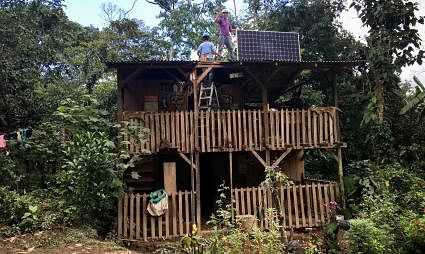 Today, I am a farmer, although I have to rent land from others so I don’t earn much of a profit. I’ve had offers over the years to work in other places and earn a better income, but I don’t like being far from home. It’s important to be close to my family and work on improving my community. I always sought out ways to bring more projects to the community and support them in any way I could. This is how I became involved with La Cuculmeca, AVODEC, and GRID Alternatives.
Today, I am a farmer, although I have to rent land from others so I don’t earn much of a profit. I’ve had offers over the years to work in other places and earn a better income, but I don’t like being far from home. It’s important to be close to my family and work on improving my community. I always sought out ways to bring more projects to the community and support them in any way I could. This is how I became involved with La Cuculmeca, AVODEC, and GRID Alternatives.
GRID Alternatives brought solar electricity to the school, the health center and 18 houses in San Isidro in 2017. This gives children and youth opportunities that we never had growing up, including spaces to get together for celebrations and meetings with the luxury of being able to switch on a light or plug in a speaker. This also allows for easier communication since community members no longer have to walk into town to charge their cell phones. I was very grateful for the electricity projects, but I still saw a large problem in our community with water. A water test showed that our potable water system was highly contaminated, so we started to brainstorm ideas of how to improve our situation. I decided that I would donate a piece of my land to dig a well and we began requesting help for the project from AVODEC and GRID Alternatives. In January of 2018 GRID came to install a solar-powered water pump that brings potable water to 24 families. This is a great relief knowing that we don’t have to go haul water from the spring to ensure clean water for our family. Now it comes to us through the tap.
Bring solar to off-grid communities. Your gift enables communities like San Isidro to shape their own future. Donate today.
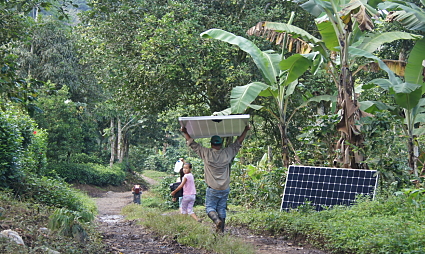 Our community has changed over the generations. reforestation projects have brought back trees that were cut down to raise cattle. Non-profit organizations have enabled us to build a school, get potable water and solar panels for electricity. My dreams are to have better road access, better education, and to form a cooperative with a revolving fund that allows us to develop our own projects without outside help. Yet we need more comprehension and organization in the community in order improve our conditions.
Our community has changed over the generations. reforestation projects have brought back trees that were cut down to raise cattle. Non-profit organizations have enabled us to build a school, get potable water and solar panels for electricity. My dreams are to have better road access, better education, and to form a cooperative with a revolving fund that allows us to develop our own projects without outside help. Yet we need more comprehension and organization in the community in order improve our conditions.
Despite being a leader, I always try to encourage others to get involved and take responsibility. I try to delegate tasks and elect others to take the title of president or director while I take a backseat. I’m always there to support if they need me, but I prefer to push others to take charge; especially because I’m getting older and I won’t always be around. It’s very important for young people to become leaders in their community and if I had to give someone advice about being a good leader, I would tell them it’s not always going to be easy. Most importantly you must be frank, clear, and honest with people. Don’t back off too easily. I used to walk into town with two left-footed boots to ask for medicine to help people in my community. So don’t make excuses; and don’t get discouraged if someone tells you no. Everything comes with time, so be patient.
